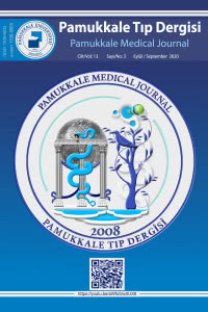Laparoskopic sleeve gastrektomi'nin kısa ve orta dönem sonuçları, tip 2 diyabet ve hipertansiyona etkileri
Sleeve gastrektomi, komorbidite, bariatrik cerrahi, orta ve uzun dönem sonuçlar
Short and midterm results of laparoscopic sleeve gastrectomy and its effects hypertension and type 2 diabetes
___
- Antipatis VJ, Gill TP. Obesity as a global problem. In: Björntorp P, ed. International textbook of obesity. Chichester: John Wiley & Sons Ltd, 2001;3-21.
- Haslam DW, James WP. Obesity. Lancet. 2005;366:1197-1209.
- Buchwald H, Williams SE. Bariatric surgery worldwide 2003. Obes Surg 2004;14:1157-1164.
- Atila K. Morbid obezitenin cerrahi tedavisi. Archives of clinical toxicology. 2014;1:23-27. Turkey.
- Sanchez SR, Masdevall C, Baltasar A, et al. Short and mid-term outcomes of sleeve gastrectomy for morbid obesity: the experience of the Spanish national registry. Obes Surg 2009;19:1203-1210.
- Menenakos E, Stamou K, Albanopoulos K, Papailiou J, Theodorou D, Leandros E. Laparoscopic sleeve gastrectomy performed with intent to treat morbid obesity: a prospective single-center study of 261 patients with a median follow-up of 1 year. Obes Surg 2010;20:276-282.
- Almogy G, Crookes PF, Anthone GJ. Longitudinal gastrectomy as atreatment for the high-risk super-obese patient. Obes Surg 2004;14:492-497.
- Noah J, Smith A, Birch D, Karmali S. The metabolic effects of laparoscopic sleeve gastrectomy: a review. J Minim Invasive Surg Sci 2013;2:3-7.
- Nocca D, Guillaume F, Noel P, et al. Impact of laparoscopic sleeve gastrectomy and laparoscopic gastric bypass on HbA1c blood level and pharmacological treatment of type 2 diabetes mellitus in severe or morbidly obese patients. Results of a multicenter prospective study at 1 year. Obes Surg 2011;21:738-743.
- Zhou D, Jiang X, Ding W, et al. Impact of bariatric surgery on ghrelin and obestatin levels in obesity or type 2 diabetes mellitus rat model. J Diabetes Res 2014;2014:569435.
- Tucker ON, Szomstein S, Rosenthal RJ. Indications for sleeve gastrectomy as a primary procedure for weight loss in the morbidly obese. J Gastrointest Surg 2008;12:662-667.
- Park JY, Song D, Kim YJ. Clinical experience of weight loss surgery in morbidly obese Korean adolescents. Yonsei Med J 2014;55:1366-1372.
- Alvarenga ES, Lo Menzo E, Szomstein S, Rosenthal RJ. Safety and efficacy of 1020 consecutive laparoscopic sleeve gasterctomies performed as a primary treatment modality for morbid obesity. A single-center experience from the metabolic and bariatric surgical accreditation quality and improvement program. Surg Endosc 2016;30:2673-2678.
- Noel P, Nedelcu M, Eddbali I, Manos T, Gagner M. What are the long-term results 8 years after sleeve gastrectomy? Surg Obes Relat Dis 2017;13:1110-1115.
- Dudric V, Constantea N, Crisan D, et al. Laparoscopic sleeve gastrectomy: short and mid-term outcome. HVM Bioflux 2016;8:171-175.
- Greenspan SF, Gardner DG. Basic and clinical endocrinology. 7th ed. NewYork: McGraw-Hill, 2004.
- Dunitz M, Kopelman PG. The management of obesity and related disorders. 1st ed. London, 2001.
- The trials of hypertension prevention collaborative research group. Effects of weight loss and sodium reduction intervention on blood pressure and hypertension incidence in overweight people with high-normal blood pressure. The trials of hypertension prevention, phase II. Arch Intern Med 1997;157:657-667.
- Sarkhosh K, Birch DW, Shi X, Gill RS, Karmali S. The impact of sleeve gastrectomy on hypertension: a systematic review. Obes Surg 2012;22:832-837.
- Leonetti F, Capoccia D, Coccia F, et al. Obesity, type 2 diabetes mellitus, and other comorbidities: a prospective cohort study of laparoscopic sleeve gastrectomy vs medical treatment. Arch Surg 2012;147:694-700.
- Slater BJ, Bellatorre N, Eisenberg D. Early postoperative outcomes and medication cost savings after laparoscopic sleeve gastrectomy in morbidly obese patients with type 2 diabetes. J Obes 2011;2011:350523.
- Schauer PR, Kashyap SR, Wolski K, et al. Bariatric surgery versus intensive medical therapy in obese patients with diabetes. N Engl J Med 2012;26;366:1567-1576.
- Shah PS, Todkar JS, Shah SS. Effectiveness of laparoscopic sleeve gastrectomy on glycemic control in obese Indians with type 2 diabetes mellitus. Surg Obes Relat Dis 2010;6:138-141.
- Casella G, Abbatini F, Calì B, Capoccia D, Leonetti F, Basso N. Ten-year duration of type 2 diabetes as prognostic factor for remission after sleeve gastrectomy. Surg Obes Relat Dis 2011;7:697-702.
- Hoogerboord M, Wiebe S, Klassen D, Ransom T, Lawlor D, Ellsmere J. Laparoscopic sleeve gastrectomy: perioperative outcomes, weight loss and impact on type 2 diabetes mellitus over 2 years. Can J Surg 2014;57:101-105.
- Gill RS, Birch DW, Shi X, Sharma AM, Karmali S. Sleeve gastrectomy and type 2 diabetes mellitus: a systematic review. Surg Obes Relat Dis 2010;6:707-713.
- Roslin MS, Dudiy Y, Weiskopf J, Damani T, Shah P. Comparison between RYGB, DS, and VSG effect on glucose homeostasis. Obes Surg 2012;22:1281-1286.
- Juodeikis Ž, Brimas G. Long-term results after sleeve gastrectomy: a systematic review. Surg Obes Relat Dis 2017;13:693-699.
- Makary MA, Clark JM, Shore AD, et al. Medication utilization and annual health care costs in patients with type 2 diabetes mellitus before and after bariatric surgery. Arch Surg 2010;145:726-731.
- ISSN: 1309-9833
- Yayın Aralığı: 4
- Başlangıç: 2008
- Yayıncı: Prof.Dr.Eylem Değirmenci
Nullipar gebe kadınlarda doğuma hazırlık eğitimin doğum şekli tercihi üzerine etkisi
Primeri bilinmeyen maligniteli hastaların değerlendirilmesinde 18F-FDG PET/BT’nin rolü
Onur KILIÇ, Asli METE, Onur BİRSEN
Musa TURGUT, Halil KOCAMAZ, Esen AVCI, Mutlu YAKA, Gülçin ABBAN METE
Mitokondrial miyopati ile seyreden SANDO sendromunda rehabilitasyon
